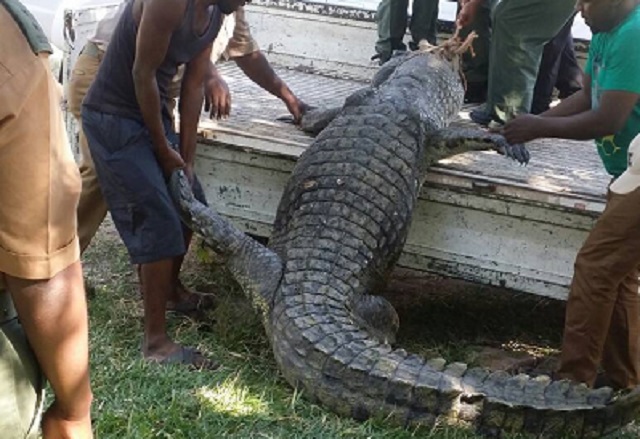Crocodiles identified as deadliest killers in Zimbabwe
By Leonard Ncube
Crocodiles have been identified as the deadliest wild animals in Zimbabwe, killing 16 of the 20 people that died in human wildlife conflicts in 2018.

In 2017 40 people were killed by wild animals and crocodiles accounted for 25, the Zimbabwe National Parks and Wildlife Management Authority (Zimparks) has said.
A total of 198 attacks by crocodiles, elephants, hippos, buffaloes and lions were reported last year resulting in 20 injuries and 20 deaths.
In 2017 there were 346 cases, 30 injuries and 40 deaths.
Zimparks spokesperson Mr Tinashe Farawo yesterday told The Chronicle that the wildlife authority is committed to reducing cases through awareness campaigns about human-wildlife conflict and swiftly responding to reports.
He said Zimparks attended to more than 80 percent of reported cases.
Crocodiles are the major killers, said Mr Farawo.
“We’re working with communities on human-wildlife conflict and the trend in terms of conflict has been going down because of our efforts to educate communities on the dangers of wildlife.
“In 2017 we lost 40 people and last year we lost 20. The major problem animal is the crocodile. Human beings can actually outpace the croc but we’re saying people must always be on the lookout and stay away from water bodies,” said Mr Farawo.
A total of 34 cases of attack by crocs were reported last year causing 16 deaths and nine injuries while in 2017 58 people were attacked resulting in 25 deaths and seven injuries.
The cases are mostly in the Zambezi Valley and around Masvingo province, Mr Farawo said.
Forty people were attacked by lions last year but with no deaths and only one injured, Mr Farawo said.
In 2017 four people were killed and two injured from 94 attacks by lions.
Elephants attacked 37 people last year causing two deaths and five injuries which is a decrease from 56 cases, 13 deaths and nine injuries in 2017.
Mr Farawo said most of the people attacked by elephants are either handlers or tourists who try to get closer to the animals which sometimes irritate them.
“We’re also saying to tourists stay away from wild animals as they can be dangerous. No matter how domesticated they are, animals are animals. It’s unfortunate that lives have been lost over the years but we are confident that we will continue with the downward trend.
“We don’t have enough resources but have managed to attend to more than 80 percent of the cases reported from communities. Our concern is that people have also lost livestock,” said Mr Farawo.
Hippos attacked 26 and killed one while buffaloes also killed a person with 13 cases of attack being recorded last year.
In 2017 there were also seven cases of people attacked by leopards and all of them were injured.
A total of 105 goats, 67 cattle and 17 donkeys were killed by wild animals last year while Zimparks shot and killed 40 problem animals, Mr Farawo said.
He said while Zimparks’ mandate is to protect wildlife, the authority also has a role to protect human life.
Over the years Zimparks came under fire from communities living adjacent to national parks after losing their livestock and human life due to human-wildlife conflict.
Mr Farawo said protection of human life is top priority.
Zimparks either translocates or eliminates problem animals when they pose danger to human beings. The Chronicle






